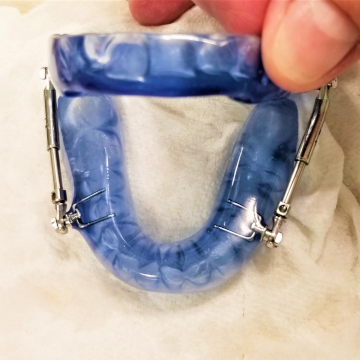
Santa Cruz, Scotts Valley CA
Are you familiar with tongue thrust? This condition, found mostly in children, occurs when the tongue presses forward too far in the mouth. A child with tongue thrust may experience difficulties with breathing, eating, or speech. You may not know that tongue thrust can also be a sign of autism spectrum disorder (ASD). Ebrahimian Integrative Dentistry explores this important connection using an integrative approach.
What Causes Tongue Thrust?
From an integrative dentistry perspective, tongue thrust results from multiple interconnected factors:
Common Causes Include:
Developmental Factors:
- Long-term pacifier use or thumb/finger sucking
- Tongue tie (restricted lingual frenum)
- Poor oral motor development
Physical Issues:
- Swollen tonsils and adenoids from allergies
- Airway restrictions affecting breathing
- Structural mouth or jaw abnormalities
Neurological Factors:
- Improper swallowing patterns related to autism spectrum disorder
- Sensory processing issues
- Neurological differences affecting muscle coordination
Environmental Factors:
- Food sensitivities causing inflammation
- Nutritional deficiencies
- Environmental toxins impacting development
Understanding Autism Spectrum Disorder (ASD)
ASD is a lifelong condition involving neurological differences that affect development. Currently affecting 1 in 36 children in the United States, autism impacts:
- Communication and social interaction
- Sensory processing and environmental responses
- Behavioral patterns and self-regulation
- Oral motor function and eating behaviors
Integrative dentistry recognizes that autism affects the whole person, including oral health and facial development.
Signs of Tongue Thrust
If your child has tongue thrust, their tongue moves forward, placing pressure on the front teeth. This creates an open bite and disrupts normal swallowing patterns.
Key Signs Include:
Visible Signs:
- Tongue visible between teeth during rest or speech
- Open bite (front teeth don’t meet when mouth is closed)
- Protruding tongue during swallowing
Functional Signs:
- Frequent mouth breathing (awake or asleep)
- Eating difficulties (too slow/fast, messy eating, gagging)
- Speech impediment, typically a lisp with S and Z sounds
- Poor lip closure or constant open mouth Secondary Effects:
- Dental misalignment from tongue pressure
- Gum irritation from improper positioning
- Dry mouth from chronic mouth breathing
- Sleep disruption due to breathing issues
The Autism-Tongue Thrust Connection
Tongue thrust is a form of stimming – repetitive movements children with autism use to cope with sensory overload. Individuals with ASD are also more prone to:
Related Oral Behaviors:
- Bruxism (teeth grinding) during sleep
- Self-injurious behaviors causing broken/chipped teeth
- Nail biting habitually
- Chewing on objects like pens or pencils
- Using teeth as tools
These behaviors often stem from sensory processing differences and the need for oral stimulation or self-regulation.
Integrative Treatment for Tongue Thrust in Santa Cruz County
Tongue thrust is an orofacial myofunctional disorder (OMD) affecting the hard and soft tissues of the face and mouth. Ebrahimian Integrative Dentistry provides comprehensive diagnosis and treatment.
Our Integrative Approach Includes:
Myofunctional Therapy:
- Simple, painless exercises to retrain the oral-facial system
- Regular practice to correct improper muscle patterns
- Customized therapy programs based on individual needs
Holistic Assessment:
- Comprehensive evaluation of oral function
- Airway assessment for breathing optimization
- Nutritional counseling to support muscle development
- Sensory processing considerations for children with autism
Biocompatible Treatment Options:
- Safe, non-toxic materials for any appliances needed
- Gentle techniques appropriate for sensitive children
- Family education on supporting treatment at home
Additional Integrative Support:
- Coordination with occupational therapists and speech pathologists
- Dietary recommendations to reduce inflammation
- Natural approaches to support neurological function
- Parent education on recognizing and managing symptoms
Benefits of Integrative Treatment
Comprehensive Care:
- Whole-person approach considering autism and oral health
- Safe, biocompatible methods for sensitive children
- Collaborative care with other healthcare providers
- Family-centered treatment with ongoing support Improved Outcomes:
- Better oral function and speech development
- Reduced secondary complications from tongue thrust
- Enhanced quality of life for children and families
- Long-term oral health preservation
Schedule Your Consultation
If you suspect your child has tongue thrust, especially in connection with autism spectrum disorder, early intervention is key. Ebrahimian Integrative Dentistry offers specialized care for children with developmental differences.
What to Expect:
- Comprehensive evaluation of oral function
- Assessment of autism-related factors
- Customized treatment planning
- Family education and support
- Coordination with your child’s care team
Ebrahimian Integrative Dentistry
Scotts Valley, CA
📞 (831) 438-4411


